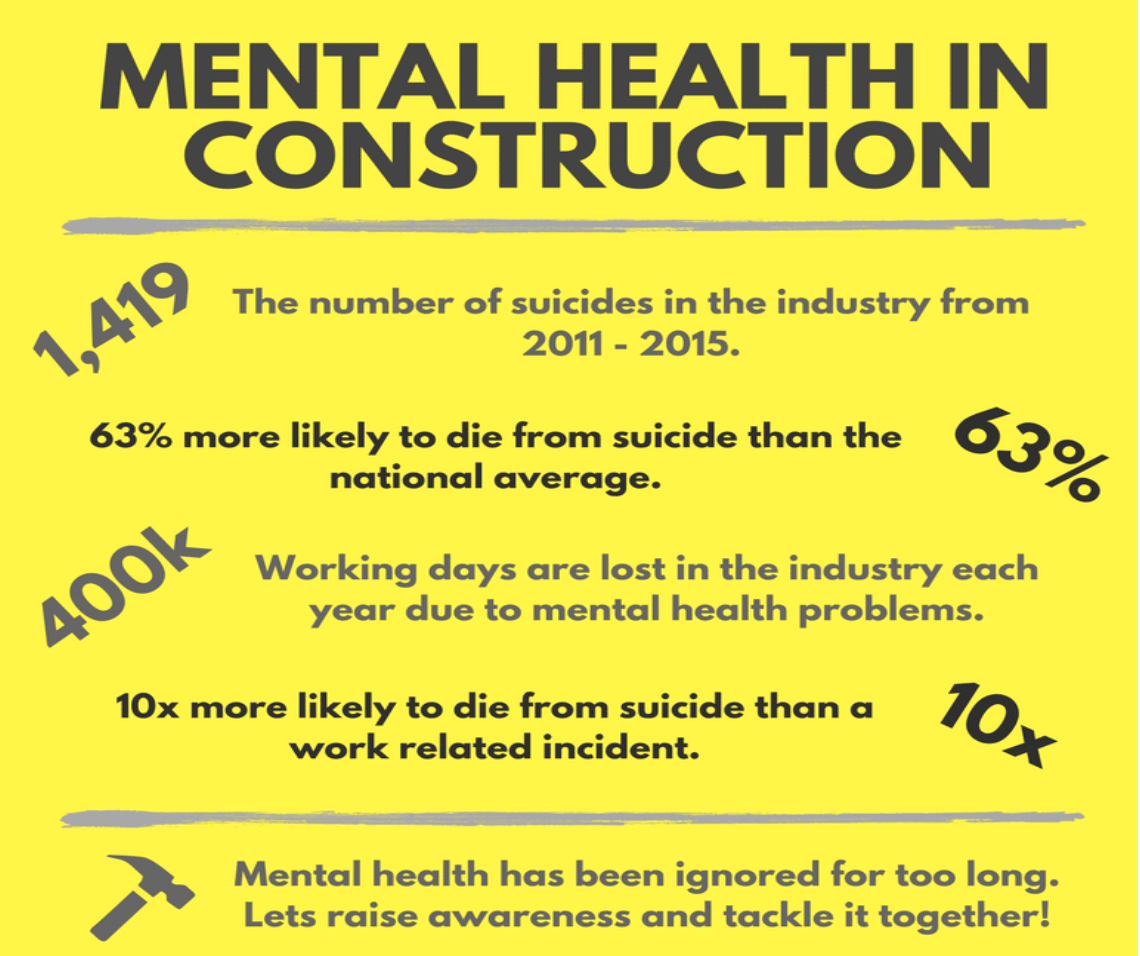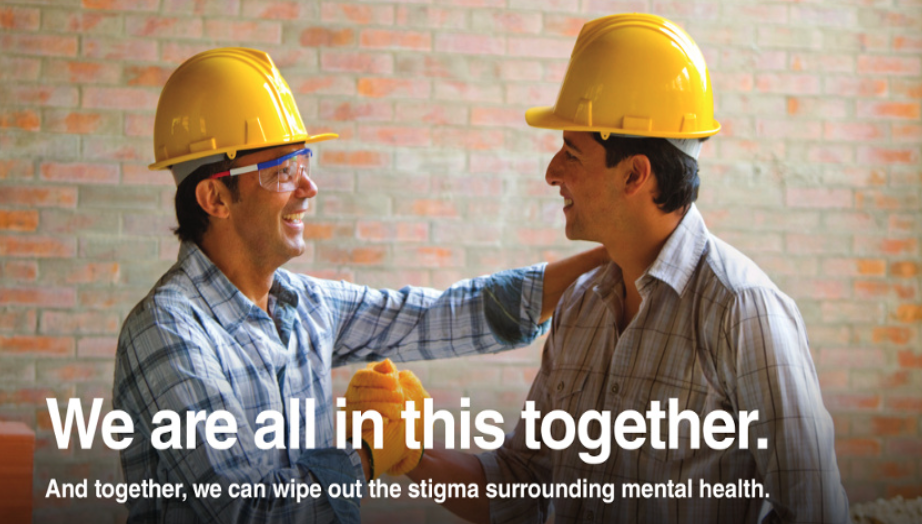 High stress and anxiety rates in construction continue to rise, as do Suicides, what are the causes? And how can we reverse the trend which is having an enormous impact on the construction industry?
High stress and anxiety rates in construction continue to rise, as do Suicides, what are the causes? And how can we reverse the trend which is having an enormous impact on the construction industry?
Construction jobs are full of stressors, but those are compounded by factors that extend beyond the workplace, including the global pandemic, Civil Disobedience, unpredictable weather conditions, and an uncertain economy. When taken together, these stressors give us at least a partial explanation of the prevalence of suicide in the industry.
However most of the Western countries, now seems to be in lockdown once again. This news naturally makes many anxious and angry, spoiling plans, threatening festive gatherings with loved ones, and even worse, threatening livelihoods, sports gatherings, and threatening homes… and, of course, threatening lives.
How are we to defend ourselves for this attack on our morale? On our resilience? On our hope I have discovered that we can live above our circumstances, above the world events that are happening around us, without living in denial, in my own journey through this extraordinary year, I have had my low points.
Sometimes, the offered breakthrough feels counterintuitive. Not only that, but it is clearly irrational. Neither our head nor our heart can agree that what I am going to share next will be appropriate or even work, Yet, I have discovered is that we can start with joy. We can intentionally choose joy, sometimes in defiance of our circumstances. Laughing in the context we have been living through, can seem irrational.
People and Emotions
Construction workers are not immune to the emotional upheaval that can come from receiving a request to return home. When that happens, there’s usually fear, uncertainty, and doubt because the jobs they rely on might be gone by the time they return.
Working close to home doing maintenance projects might be a convenient alternative, but the pay is significantly less, on out-of-town jobs, workers typically receive a per diem.
On the home maintenance projects, the pay can be cut by as much as 50%, there’s no overtime, and workers do a straight 40 hours per week.
There’s no clear winning formula in either scenario, Construction professionals are working harder and working longer hours.
“During this pandemic I have not had one day off, “I have worked overtime and heard of numerous clients /customers of mine closing doors, getting sick, or being in the same boat as myself. The mental burden is very taxing, my heart aches for so many,”
 On most construction sites, there’s no vacations or sick time. Life just goes on, which is very stressful and leads to frustration and anger.
On most construction sites, there’s no vacations or sick time. Life just goes on, which is very stressful and leads to frustration and anger.
“I’ve had to intervene to calm people down, “You’re told to leave home at the gate, but you don’t know where the next project is coming from. On the other hand, these are once in a lifetime events that you never get back, so you try to find ways to cope.” “I’ve seen too many divorces because of the difficulty of managing the time/money balance in the construction field,” he often manages the time/money balance by scheduling time to talk to family — typically on the way to and from work.
His head is then clear to deal with everyday hazards because people rely on him/her for safety and protection. The safety person must be well-rested and mentally alert to protect others.
Statistics Tell the Story
Dr. Bill Pomfret, Managing Consultant; of Safety Projects International Inc, has a background in risk management, compliance, and occupational health & safety. He believes that the traditional focus in the construction industry has been on safety, but not mental wellness.
In Canada, there are approximately three workplace-related fatalities per day and 1,017 per year, according to OHS Canada, while there are 10 suicides per day and 4,000 suicides per year, according to the Government of Canada’s website.
Though it is difficult to assess whether suicides are directly related to work-related stress factors, Pomfret believes it is a contributing factor.
The stress, disruption, and uncertainty caused by the pandemic is also causing pronounced mental health concerns, including suicidal thoughts and feelings, according to the Mental Health Commission of Canada.
In Canada, 500,000 workers are off work due to mental health reasons r according to the Commission. So the question is what can we do from an awareness and education perspective to deal with the increasingly complex problem of mental health and wellness in the construction industry?
Dr. Pomfret said that Canada is the first country to create psychological & workplace standards, CAN/CSA-Z1003-13/BNQ 9700-803/2013 – Psychological Health and Safety in the Workplace. He said that anxiety and depression are costing the Canada economy $51 billion pre-pandemic.
Moreover, according to the Centers for Disease Control & Prevention (CDC), construction has one of the highest suicide rates (49.4/100,000) across all industries in the United States. In fact, more lives are lost per day from suicide than from all of OSHA’s Fatal Four Hazards combined.
Why Does Construction Have Such a High Suicide Rate?
Many share the belief that the type of workplace culture found in the construction industry directly correlates to the high rates of suicide among workers. There’s a culture of toughness, combined with a sense of fearlessness and thrill-seeking.
Things like family separation, isolation, extensive travel, sleep disruption and deprivation due to shift work, seasonal layoffs, and end-of-project furloughs are all factors that can be hard to handle. On top of that, there’s a prevalence of chronic pain and alcohol and substance abuse, coupled with performance pressures (schedule, budget, quality).
Solutions & Suggestions
“We need to relook at the employer/employee relationship and create more of a positive impact in the workplace,” said Pomfret.
“How we interact at work starts with little things, like civil discourse, but things can escalate quickly because workers are stressed, they’re thrown together and they have to evolve into artificial communities,” he said.
Pomfret believes that reporting harassment to your supervisor may be a trap because the supervisor may be causing the harassment or the supervisor tries to play psychologist when they’re not qualified
Pomfret recommends creating a mental health first responder position to create a psychologically safer workplace. This is an idea promoted by both the Red Cross and Safety Projects International Inc.
Suicide Prevention
One bright spot in all this is the Construction Industry Alliance for Suicide Prevention (CIASP). The CIASP was born out of necessity in response to the CDC statistics.
Established by the Construction Financial Management Association (CFMA) in 2016 to shatter the stigma surrounding mental health issues, CIASP became a standalone 501(c)(3) organization in 2018. Their goal is to raise awareness about suicide prevention and provide resources and tools to create a zero-suicide industry by uniting and supporting the construction community.
But there are also things you can do at a more grassroots level.
The construction community needs to band together to recognize these critical issues. Talk to one another. Check in. Don’t assume the person working nearby is just fine, once we start really conversing and caring, then we can make some headway.
BIO:
Safety Projects International has designed and developed a new comprehensive standard for any public procurement framework and has developed a 5-day training course for Contract staff which will teach pro-active standards against corruption and how to effectively measure the performance of supply changes.
Dr Bill Pomfret; MSc; FIOSH; RSP. FRSH;
Founder & President.
Safety Projects International Inc, &
Dr. Bill Pomfret & Associates.
26 Drysdale Street, Kanata, Ontario.K2K 3L3.
www.spi5star.com pomfretb@spi5star.com
Tel 613-2549233
